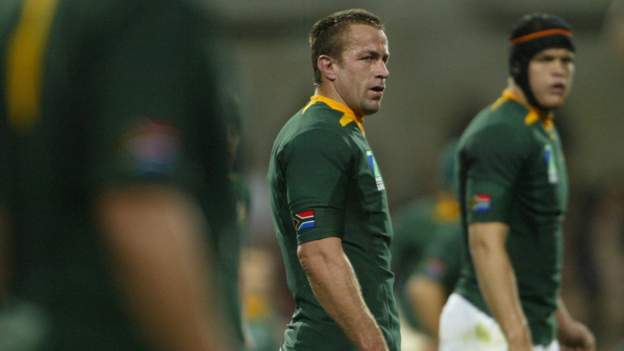
South Africa are the reigning rugby world champions and the number one ranked team globally but as yet none of its players past or present have decided to take legal action against their national rugby body and World Rugby for alleged negligence.
However, there is certainly support for the players, which includes four former England and Wales internationals, who intend to sue over brain damage caused by blows to the head while training for and playing rugby.
Former South Africa captain Corne Krige, who retired from the game in February 2005 at the age of 30, admits the case of his former team-mate at Northampton Saints Steve Thompson has caused him concern.
England hooker Thompson, who says he cannot remember winning the World Cup in 2003 despite playing in every game of the campaign, is one of those diagnosed with early signs of dementia.
"If I look at Steve Thompson, who I've played with and against, when he says he can't even remember winning the World Cup in 2003, that's very serious," he told BBC Sport Africa.
"I must admit that after reading about Steve's case and that of the other guys, I've started thinking about my own life and about me forgetting things and cross-referencing with my wife.
"When you do get to my age at 45, we do tend forget things but when you can't remember serious stuff like winning a World Cup, as is the case with Steve, then it's very serious."
You know there's a 'massive risk'
Krige, who captained South Africa in 18 of the 39 Tests he played, said taking legal action is a tricky issue, given the physical nature of rugby.
"When you play rugby you play with the knowledge that there's a massive risk at stake. If you play in certain positions there is a higher risk," says Krige, who led the Springboks at the 2003 World Cup in Australia.
"I can understand what they are doing, so they can at least get some financial assistance and medical support on top of that.
"It's a difficult one because you do go into the game knowing that there's serious risk involved so it's going to be interesting to see how the case progresses.
"I was never concerned about brain damage while I was playing - you see it as part of the game.
"I suffered lots of concussions during my career but at all times I felt that the medical personnel and everyone involved with that side of things pretty much did their best to look after my health."
Promising progress
Krige says he has been encouraged by the progress made by the rugby authorities in addressing the issue of concussion and head injuries in the game.
Concussion usually involves a brief period of unconsciousness after a blow to the head or neck. The force causes the individual's brain to bounce inside his head as it collides with the walls of the skull.
The loss of consciousness is due to disturbance of the electrical activity in the brain.
"Rugby has been proactive in terms of trying to alleviate the problem of brain damage. It's certainly much better than when I played," he pointed out.
"The Head Injury Impact Assessment (HIA) is a very good thing. In our days you would get concussed, be lights out and then five minutes later you play again. There were no head impact assessments at the time."
The HIA, which was adopted into law in 2015, requires players to be assessed in the event of head contact and where the prognosis is not clear, it allows for a player to be temporarily replaced for a maximum of 12 minutes.
No legal action - yet
Eugene Henning, CEO of MyPlayers, the organisation representing all South Africa's professional rugby players, said none of his members have asked to take legal action.
"To date, we have received no requests from any of our members to act on or prepare an argument with regards to player claims for alleged negligence," he told BBC Sport Africa.
"Also, we haven't seen the legal arguments being put forward by those players, so we cannot, at this stage, comment on that specifically."
Henning says he is also encouraged by the emphasis being put on player safety and head injuries.
"In February 2020, MyPlayers took part in a World Rugby player safety symposium in Paris where head injuries rightly received a lot of attention," he said.
"Research on head injuries in rugby and the available results were presented and it was evident that the topic is high on World Rugby's agenda.
"During the past 12 to 24 months, we have been encouraged to see the efforts players and officials made in prioritising the safety of players in this regard, both in terms of players' technique in various contact situations and in the way match officials dealt with behaviours that jeopardise players' safety.
"It is essential that rugby be made as safe as possible as quickly as possible. In a game such as this, the priority being put on player safety can never be too high.
"Together with the International Players Organisation, we are monitoring the global movement as closely as possible, and we are keeping our finger on the pulse for any local claims or mentions in this regard.
"At this time, the legal battle has not reared its head in South Africa, but the overarching conversation regarding player safety and head injuries has long been ongoing, and as the players' representative body, we welcome these efforts."















 Phone: (800) 737. 6040
Phone: (800) 737. 6040 Fax: (800) 825 5558
Fax: (800) 825 5558 Website:
Website:  Email:
Email: 






